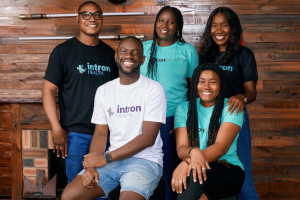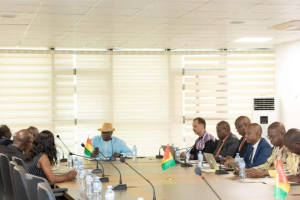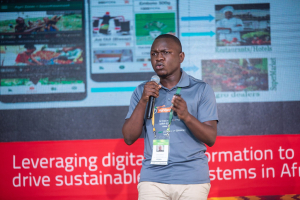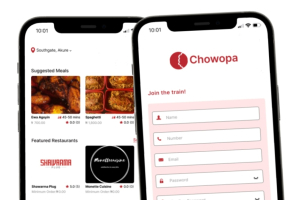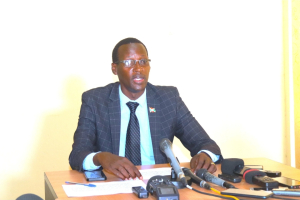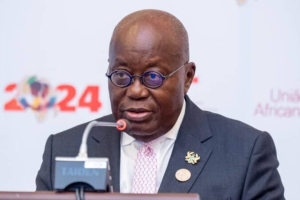La Rédaction
AFTS Opens Nominations for 2024 Excellence in Fintech Awards
The Africa Fintech Summit (AFTS) has opened nominations for the 2024 Excellence in Fintech Awards. Since its inception in 2018, this event has consistently brought together key players in Africa's fintech ecosystem. This year's edition will take place in Nairobi, Kenya, from Wednesday, September 4, to Friday, September 6. The public is encouraged to nominate startups and prominent figures within the ecosystem across various categories.
Le nigérian Intron Health obtient un financement de 1,6 million USD
La start-up nigériane Intron Health, spécialisée dans la reconnaissance vocale clinique, a annoncé le jeudi 25 juillet qu’elle a levé 1,6 million de dollars lors d’un tour de financement de pré-amorçage. Ce nouveau financement sera utilisé pour intensifier les recherches, améliorer les capacités de l’entreprise sur le cloud et étendre sa distribution. Intron Health prévoit également de renforcer son équipe en recrutant des talents techniques.
Lire aussi:
La CEDEAO et la Guinée discutent du projet de câble sous-marin Amilcar Cabral
En 2022, seulement 34 % de la population en Afrique de l'Ouest et centrale avait accès à une connexion haut débit, selon la Banque mondiale. Pour améliorer cette situation, des initiatives régionales sont en cours pour accroître le taux de connectivité dans ces régions.
La mise en œuvre du câble sous-marin de télécommunications Amilcar Cabral, destiné à relier le Cap-Vert, la Gambie, la Guinée, la Guinée-Bissau, le Liberia et la Sierra Leone, prend progressivement forme. Une délégation de la Communauté économique des Etats de l'Afrique de l'Ouest (CEDEAO), conduite par M. Sediko Douka, commissaire aux infrastructures, à l'énergie et à la digitalisation, a rencontré M. Nouha Traoré, secrétaire général du ministère des Postes, des Télécommunications et de l’Economie numérique de la Guinée, le lundi 3 juin, pour discuter du développement de ce projet stratégique.
« Les discussions ont porté sur plusieurs points clés du projet, notamment son caractère régional et son importance pour l’intégration de la CEDEAO, les étapes techniques clés à mettre en œuvre, l’obtention des permis nécessaires au déploiement du câble, ainsi que les aspects financiers du projet », a indiqué le ministère guinéen chargé du numérique dans un communiqué.
L’initiative intervient plus d’un an après la signature d’un protocole d’accord avec la Commission de la CEDEAO pour le développement du projet. Dans le cadre de ce partenariat, les six Etats concernés se sont engagés à participer au processus d’évaluation de la faisabilité technique, économique, financière, sociale et environnementale du projet, ainsi qu’à mobiliser les ressources nécessaires à sa mise en œuvre. La Commission de la CEDEAO se chargera de coordonner la réalisation du projet en interagissant avec les pays bénéficiaires, les bailleurs de fonds et autres parties prenantes.
La Guinée et la Gambie, à travers le Programme régional d’intégration numérique en Afrique de l’Ouest (WARDIP), ont mobilisé un financement de la Banque mondiale pour la mise en œuvre du projet. Le projet, d’un coût estimé à plus de 90 millions de dollars, est crucial pour la région.
Une fois réalisé, le câble sous-marin Amilcar Cabral devrait renforcer la capacité des télécommunications internationales, améliorer l’accès aux services numériques et fournir la redondance essentielle pour garantir la résilience de l’Internet à haut débit dans les pays concernés. Il est également prévu que ce câble améliore l’infrastructure numérique nécessaire pour attirer les investissements étrangers, créer des emplois et soutenir le développement de l’économie numérique dans la région.
Lire aussi:
Guinée et Gambie s'attaquent ensemble aux problèmes de connectivité avec un nouveau câble sous-marin
Reliance Industries to Offer 5G Network Infrastructure in Africa
Digital technologies are crucial for driving economic growth, innovation, job creation, and social inclusion. However, Sub-Saharan Africa (SSA) grapples with significant challenges in digital development, such as underdeveloped infrastructure and costly connectivity. Entry into the African telecom market with 5G infrastructure is pivotal for African development, promising to enhance digital inclusion, spur economic growth, reduce costs for local telecom operators, and hasten technological progress.
Reliance Industries Ltd (RIL) is set to enter the African telecom market by providing 5G shared network infrastructure through its subsidiary Radisys, in collaboration with Next-Gen Infrastructure Co. (NGIC), backed by the Ghanaian government. Radisys announced this on May 27.
"By bringing Fixed Wireless Access alongside 4G and 5G cellular services to help drive economic growth and digital inclusion, Radisys looks forward to helping Ascend and NGIC build a disruptive and affordable shared broadband infrastructure across Ghana," said Arun Bhikshesvaran, CEO of Radisys.
Radisys, owned by RIL's unit Jio Platforms Ltd (JPL), along with Tech Mahindra and Nokia, will collaborate with NGIC to develop 4G and 5G networks across Africa, starting with Ghana. NGIC plans to invest $200 million in this initiative over the next three years, offering the networks as shared resources to local mobile operators to cut costs. With partnerships already established with AT Ghana and Telecel Ghana, NGIC aims to replicate India's low-cost, high-speed data model, providing affordable and efficient digital services across the continent.
This investment aligns with the strategy outlined in August 2023 by Owusu-Ekuful, Ghana’s Minister for Communication and Digitisation, during the 12th African Peering and Interconnection Forum (AfPIF). She disclosed the government's decision not to issue a 5G license, which would require significant investment from telecom operators. Instead, the government plans to establish a neutral shared infrastructure company to provide the necessary networks to operators.
Andrew Dabalen, the World Bank's Chief Economist for Africa, emphasized that increasing mobile internet usage could create jobs and spur economic recovery. A 2023 World Bank report (Digital Transformation Drives Development in Africa) revealed that extreme poverty decreased by around 7% in Nigeria and Tanzania, and labor force participation increased by up to 8% after three or more years of internet coverage. Addressing these gaps is crucial for fully harnessing digital technologies' potential in SSA.
Hikmatu Bilali
Congo: Steve Ndende connects farmers, investors, and customers through Agri Zoom
He has over 12 years of experience in software development. He has created and developed several technological solutions aimed at supporting the workforce in Africa.
Steve Ndende (photo), a Congolese entrepreneur and computer scientist, is the founder and CEO of Agri Zoom, a platform launched to provide farmers with access to loans and a marketplace for selling their products.
Launched in 2018, Agri Zoom offers a crowdfunding system for farmers, fishers, and processors of agricultural products. Its online marketplace simplifies the sale of crops, allowing farmers to concentrate on production.
In addition to Agri Zoom, Ndende is the founder and CEO of MboteShop, an e-commerce platform that operates in the Republic of Congo, the Democratic Republic of Congo, Gabon, and Cameroon. Launched in 2021, MboteShop is one of Ndende’s many entrepreneurial ventures.
Ndende is also the founder and a web developer at Essengo Solutions, a digital communication and software development agency. Established in 2023, Essengo Solutions supports companies and individuals in their digital transformation.
The entrepreneur has a robust professional background. He earned a degree in software engineering from Ecole africaine de développement in Brazzaville in 2015 and a professional diploma in entrepreneurial studies from the University of Iowa in 2019. Before founding his own companies, he served as the technical director at Eyano until 2022 and co-founded Ndende Lab in 2017, where he worked as a developer until 2022.
In addition to his entrepreneurial activities, Ndende was an active contributor to the Fongwama open-source development community from 2015 to 2018. He also served as a trainer and speaker at JCertif International, a non-profit organization that organizes training and events in IT and communication technology, from 2015 to 2022.
Ndende’s commitment and professional achievements have been recognized on multiple occasions. In 2018, he won first prize in the FAO’s global challenge “My Food My Future.” In 2019, his start-up Agri Zoom was selected as one of the Top 1000 Entrepreneurs by the Tony Elumelu Foundation.
Melchior Koba
Chowopa Connects Users to Nigerian Restaurants
The solution was developed to streamline meal deliveries in Nigerian cities. It notably focuses on secondary cities.
Chowopa, a Nigerian startup, has developed a last-mile delivery solution that allows users to order food from their favorite restaurants and have it delivered straight to their homes or offices. The startup was founded in 2022 by Umebe Anthony and Umoru-Musa Abdullahi and is headquartered in Akure, a city in Ondo State.
The Chowopa solution is accessible through a mobile app, available on both iOS and Android platforms. After installing the app, users can create an account by entering their personal details. Once registered, they can place orders from a variety of partner restaurants listed on the platform.
The app allows users to search for restaurants based on location, type of cuisine, or customer ratings. Users can input a specific location within a city or state in the search bar to find restaurants that cater to that area. They also have the option to select a particular type of cuisine, such as African, fast food, Indian, and more. Customer reviews are available to help users choose between restaurants. After their meal is delivered, Chowopa encourages users to rate the service based on the quality of the food and the speed of delivery. Users can also leave comments to provide feedback on their experience.
Restaurants interested in joining the platform can do so by clicking on the "Sell on Chowopa" button and following the registration process. They will be asked to provide details such as the restaurant's name, the owner's name, email address, and phone number.
Adoni Conrad Quenum
Le Burundi mène une enquête nationale sur l'accès et l'usage des TIC
Le gouvernement burundais s'est engagé à moderniser les services offerts aux citoyens, mais plusieurs régions du pays ne bénéficient pas encore d'une couverture Internet complète ni des compétences numériques nécessaires, ce qui limite l'accès aux services numériques dans ces localités.
Le ministère de la Communication, des Technologies de l'Information et des Médias a annoncé, le lundi 29 avril, le lancement d'une enquête nationale sur l’accès et l'usage des TIC auprès des ménages, des entreprises et des administrations publiques au Burundi. Cette initiative vise à évaluer l’état d'utilisation et d'accès aux services numériques, ainsi qu'à cerner les connaissances et les besoins des populations burundaises.
1/5. Le #MINCOTIM a annoncé ce 29 avril le début de l’enquête nationale sur l’accès et l’utilisation des TIC auprès des ménages, entreprises et administrations publiques au Burundi, dans un point de presse animé par M. Thierry Kitamoya, Assistant du #MINCOTIM. pic.twitter.com/Li4ncsVmAb
— PAFEN (@PafenBurundi) April 29, 2024
Selon Thierry Kitamoya (photo), assistant du ministre chargé des TIC, cette enquête s'inscrit dans le cadre du Projet d’appui aux fondations de l’économie numérique (PAFEN), financé par la Banque mondiale à hauteur de 92 millions de dollars. Le PAFEN a pour objectif d'accroître l'accès à Internet à haut débit pour les populations mal desservies, d'améliorer la capacité du gouvernement à fournir des services par voie numérique et de jeter les bases d'un développement accéléré de l'économie numérique au Burundi.
Lancée le 29 avril dernier, l'enquête se poursuivra jusqu'au 17 mai, sous la conduite du Centre d'étude et de recherche en population et développement (CERPED), une institution burundaise, ainsi que de la société tunisienne SFM Technologies. Cette enquête ciblera des échantillons variés, répartis dans différentes communes et provinces du pays, afin de fournir une vue d'ensemble précise de l'accès aux TIC et de leur utilisation au Burundi.
Les résultats de l'enquête en cours permettront également d'éclairer la conception et le ciblage des programmes d'accès numérique, de formuler de nouvelles politiques en matière de large bande, et d'évaluer le niveau de pénétration des technologies de l'information et de la communication au Burundi.
Lire aussi:
Glovo Ends Operations in Ghana, Shifts Focus to Other African Markets
Food delivery platform Glovo will cease operations in Ghana on May 10, 2024, despite a previous €3.5 million ($3.7 million) investment for expansion, citing profitability issues.
Following this, Glovo will focus on other African markets, including Morocco, Uganda, Kenya, Côte d'Ivoire, and Nigeria.
Despite Co-founder Sacha Michaud's positive outlook on Ghana's market in 2021, challenges such as high taxes and inflation have led to this decision. Yet, the online food delivery market in Ghana is projected to generate US$224.60 million in revenue in 2024.
LA TECH EN ALGERIE
| Population | 46 092 251 (2024) |
| Abonnés mobile | 50,5 millions (2023) |
| Taux de pénétration mobile | 114,42% |
| Abonnés Internet mobile | 46,9 millions |
| Taux de pénétration Internet | 88,17% |
| Technologie mobile | 2G, 3G, 4G |
| Km de fibre optique publique | Près de 140 000 (2023) |
|
DATA CENTER
|
|
SOUTIENS PUBLICS AUX START-UPS
|
|
INCUBATEURS/ACCELERATEURS PHARES :
|
Le président ghanéen milite pour une interopérabilité de la téléphonie mobile en Afrique
La transformation numérique continue de s’accélérer en Afrique avec une adoption croissante des services mobiles. La région de l’Afrique subsaharienne comptait 489 millions d’abonnés uniques à la téléphonie mobile en 2022 pour un taux de pénétration de 43 %.
Le président du Ghana Nana Akufo-Addo (photo) a exhorté les membres de l’Union africaine (UA) à œuvrer pour la mise en œuvre d’un système d’interopérabilité de la téléphonie mobile en Afrique. Il a fait cette déclaration à l’occasion de la 37e Session ordinaire de l’Assemblée des chefs d’Etat de l’UA qui s’est tenue du samedi 17 au dimanche 18 février à Addis-Abeba, en Ethiopie.
Selon le président, cette initiative devrait permettre d’accélérer la mise en œuvre effective de la Zone de libre-échange continentale africaine (ZLECAf). Il a ajouté que cela faciliterait la réduction voire la suppression des frais d’itinérance à travers le continent.
Notons que des efforts sont consentis au niveau des sous-régions pour la suppression des frais d’itinérance mobile, entre autres. Les pays de la Communauté de développement de l’Afrique australe (SADC) cherchent à mettre en place une zone de réseau unique (ONA) afin de se rapprocher d’un marché numérique unique. Les pays de la Communauté de l’Afrique de l’Est (EAC) et ceux de la Communauté économique des Etats de l’Afrique de l’Ouest (CEDEAO) ont également mis en œuvre des projets similaires.
Par ailleurs, au niveau de la CEDEAO, le Ghana et la Côte d’Ivoire sont devenus en juillet 2023 les deux premiers pays à mettre en œuvre le règlement n° C/REG.21/12/17 relatif à l’itinérance sur les réseaux publics de communications mobiles. Des pays comme le Bénin, le Togo, le Mali, le Burkina Faso ont également entamé les démarches pour se mettre en règle.
Une fois mis en œuvre, l’interopérabilité des réseaux de téléphonie mobile en Afrique devrait permettre de faciliter les communications entre les pays du continent, notamment grâce à la réduction des coûts. Cela devrait également faire des télécommunications un outil d’intégration économique et d’inclusion dans un contexte de transformation numérique accélérée.
Isaac K. Kassouwi
Lire aussi:



